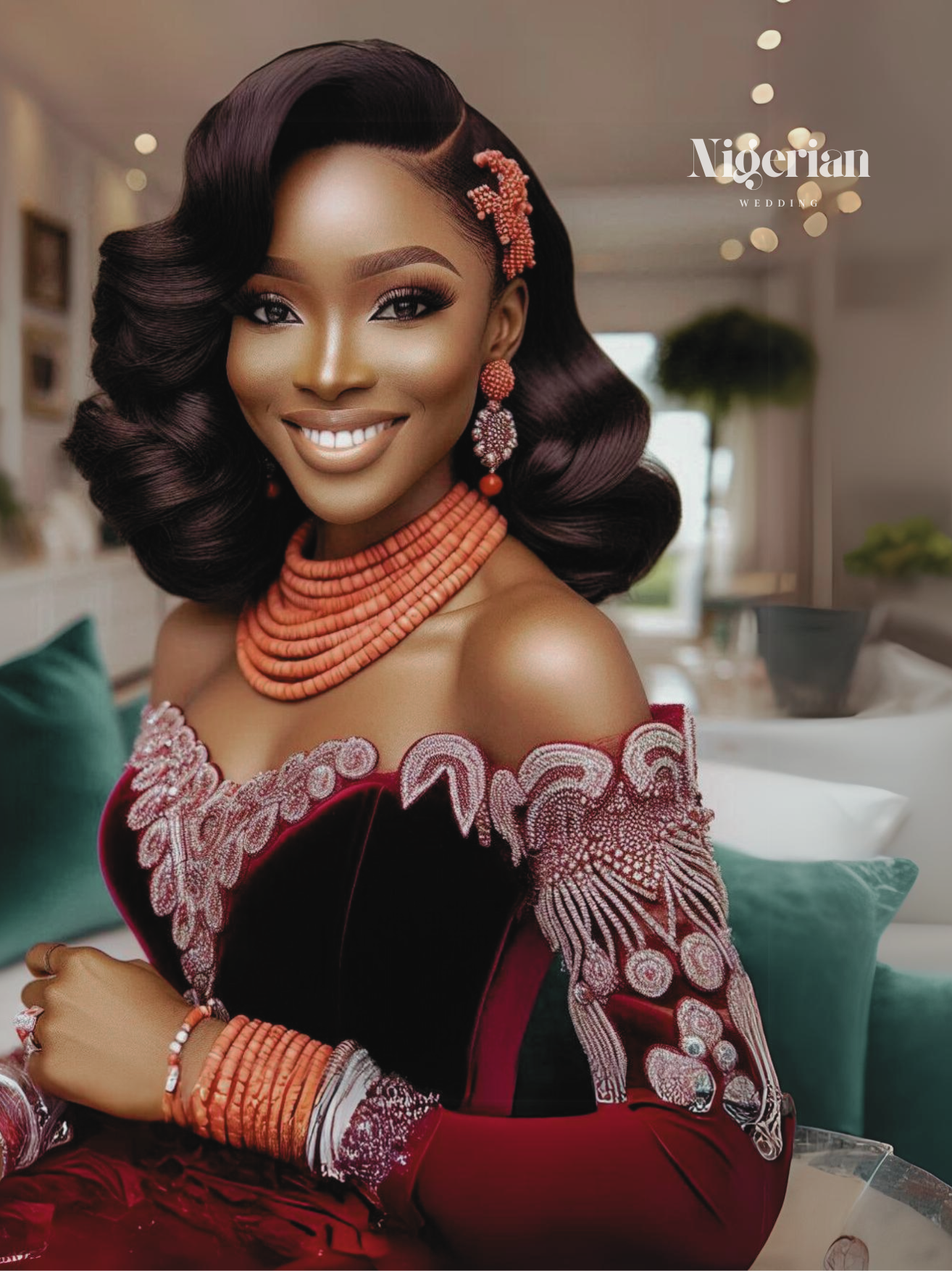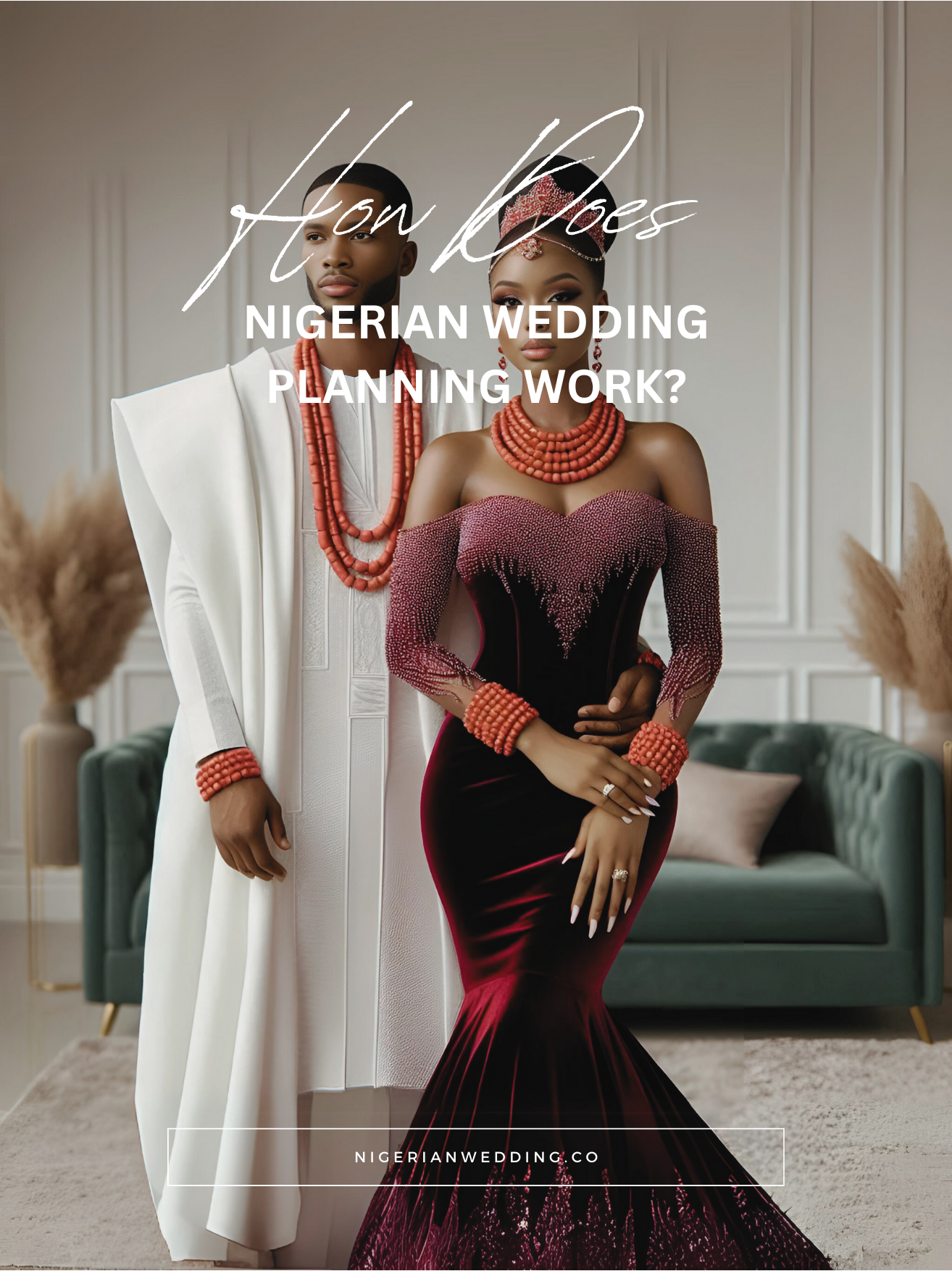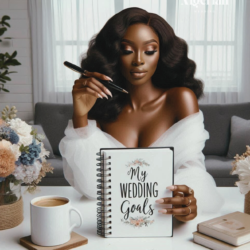How Does Nigerian Wedding Planning Work? Nigerian weddings are vibrant, cultural celebrations that combine traditional customs with modern influences. They’re often large-scale, elaborate events that involve both religious and cultural ceremonies, filled with rich traditions, beautiful attire, and colorful festivities. For many Nigerians, weddings are not just about the couple but also about uniting two families and celebrating with the community. This guide explores the steps involved in Nigerian wedding planning, from traditional rites to modern ceremonies, and provides recommendations for a seamless and joyous event.
Key Elements of Nigerian Weddings
Nigerian weddings are typically divided into two major ceremonies:
- Traditional Wedding (Cultural/Tribal Ceremony)
- White Wedding (Religious/Western Ceremony)
Each ceremony plays a vital role in the couple’s union and reflects the diversity of Nigeria’s many ethnic groups, such as the Yoruba, Igbo, Hausa, and others. The combination of both ceremonies is common, and they often take place over the course of multiple days or weeks.
1. Traditional Nigerian Wedding
The traditional wedding is deeply rooted in cultural practices and varies depending on the couple’s ethnic background. It is a symbolic and essential event that honors the couple’s heritage and unites the two families.
Key Features of a Traditional Nigerian Wedding
- Introduction Ceremony: Before the traditional wedding, many families hold an introduction where both families formally meet. This usually happens in the bride’s family home and sets the tone for the upcoming union.
- The Bride Price (Dowry): In many Nigerian cultures, a key part of the traditional wedding involves the presentation of a bride price, also known as the dowry, from the groom’s family to the bride’s family. The dowry may consist of money, gifts, livestock, or food items that symbolize respect and appreciation.
- Ceremonial Attire: Traditional attire plays a huge role, with both the bride and groom dressed in colorful, elaborate outfits. Fabrics such as aso-oke (Yoruba), george (Igbo), or agbada (Hausa) are popular choices, with each culture having its distinctive attire.
- Kola Nut Ceremony: Among the Igbo, the presentation of the kola nut is a significant symbol of hospitality and agreement between the two families.
- Traditional Rites: Each ethnic group has specific customs. In a Yoruba wedding, for example, the groom and his family must “prostrate” themselves before the bride’s family as a sign of respect, while in Hausa weddings, fatiha, a religious ceremony, is central.
- Entertainment and Dancing: Traditional music, dancing, and entertainment are a key part of Nigerian weddings. The talking drum is common in Yoruba weddings, while Igbo weddings often feature cultural dances like the Atilogwu.
Recommendations for Traditional Weddings:
- Hire a Cultural Wedding Planner: Nigerian weddings are rich in tradition, and having a wedding planner who understands the cultural nuances can help ensure that all rites are respected and carried out smoothly.
- Prepare for a Large Guest List: Nigerian weddings tend to have large guest lists, sometimes with hundreds or even thousands of attendees. Plan accordingly with venue capacity, catering, and seating arrangements.
- Budget for Customs: The bride price, gifts, and other cultural practices can add to the wedding budget. Factor these costs in when planning.
- Cultural Attire: Invest in high-quality fabrics and hire a tailor experienced in traditional Nigerian attire to create stunning outfits for the bride, groom, and bridal party.
2. The White Wedding
The white wedding, which is influenced by Western traditions, usually follows the traditional ceremony. It’s typically a Christian or Islamic religious ceremony, depending on the couple’s faith, followed by a reception. This ceremony mirrors what most people associate with a modern wedding, complete with formal vows, a wedding gown, and a suit.
Key Features of a White Wedding in Nigeria:
- Church Ceremony or Islamic Nikah: Christian couples often have their white wedding in a church, where they exchange vows before God. Muslim couples may opt for an Islamic nikah, which can be held in a mosque or home.
- The Wedding Attire: The bride usually wears a white wedding dress, while the groom wears a tuxedo or suit. It is not uncommon for couples to change outfits several times throughout the day, transitioning from white wedding attire to traditional outfits for the reception.
- Bridal Train: Similar to Western weddings, Nigerian white weddings often have a large bridal train, including bridesmaids, groomsmen, a maid of honor, and a best man.
- Reception Party: The reception is the highlight of the day. It often takes place in a large hall or hotel ballroom and includes cutting the cake, toasts, speeches, and dancing. Nigerian wedding receptions are known for their lively atmosphere, great food, and traditional music.
Recommendations for the White Wedding:
- Start Early with Venue Booking: White weddings in Nigeria are often large, and venues get booked out months in advance. Consider a hotel ballroom, church hall, or garden space for the reception.
- Multiple Outfits: Plan for several outfit changes. Nigerian brides and grooms often switch between their wedding attire and traditional attire during the reception.
- Professional Vendors: Hire a professional wedding photographer, videographer, and makeup artist. Nigerian weddings are known for their glamour, and capturing those moments in high quality is important.
3. Nigerian Wedding Timeline and Planning
The complexity of Nigerian weddings, with both traditional and white weddings to coordinate, requires careful planning. A detailed timeline will ensure that all aspects are covered and reduce last-minute stress.
Example Nigerian Wedding Timeline:
| Months Before Wedding | Tasks |
|---|---|
| 12-14 Months | Set budget, start drafting guest list, book venues (church, mosque, traditional venue, reception hall) |
| 9-12 Months | Hire wedding planner, research vendors (photographer, caterer, florist, etc.), purchase traditional attire |
| 6-9 Months | Send out save-the-dates, finalize guest list, book entertainment (DJ, live band), secure bridal attire |
| 3-6 Months | Order invitations, finalize décor, arrange for bridal and groomsmen outfits, arrange transportation |
| 1-3 Months | Send out invitations, plan traditional and white wedding programs, coordinate with all vendors |
| 1 Month | Finalize seating chart, conduct final walkthroughs at venues, ensure all outfits are ready, schedule rehearsals |
Wedding Planning Tools:
- Wedding Planners: Consider hiring a planner who specializes in Nigerian weddings. Their knowledge of both traditional and white wedding customs will be invaluable.
- Apps and Websites: Tools like Zola and The Knot can help couples keep track of tasks, guest lists, and vendors.
4. Nigerian Wedding Budgeting
Nigerian weddings, especially those that combine traditional and white weddings, can be expensive. According to estimates, the average Nigerian wedding costs anywhere from ₦2 million to ₦10 million (about $2,600 to $13,000), depending on the scale and location.
Common Costs in Nigerian Weddings:
- Venue: Wedding venues, especially in big cities like Lagos, can be expensive. Expect to pay around ₦500,000 to ₦1 million for a popular venue.
- Catering: Nigerian weddings serve a large variety of food, including traditional dishes like jollof rice, moi-moi, and assorted meats. Catering costs can range from ₦2,000 to ₦5,000 per guest.
- Entertainment: Hiring a live band or popular DJ is common, and this can cost between ₦200,000 and ₦1 million depending on the talent.
- Photography and Videography: High-quality photo and video coverage is a must, with costs ranging from ₦300,000 to ₦1 million.
- Traditional Expenses: For the traditional wedding, additional costs include the bride price, gifts for family members, and traditional attire.
Recommendations for Budgeting:
- Set a Realistic Budget: List all expected expenses for both the traditional and white weddings. Include hidden costs like transportation, accommodation for out-of-town guests, and gifts.
- Track All Expenses: Use a wedding budget tracker to ensure you stay within your financial limits. Adjust as needed if you find costs are exceeding initial estimates.
- Negotiate with Vendors: In Nigeria, negotiation is often part of the process. Don’t hesitate to negotiate rates with vendors, especially if you’re booking multiple services from the same company.





